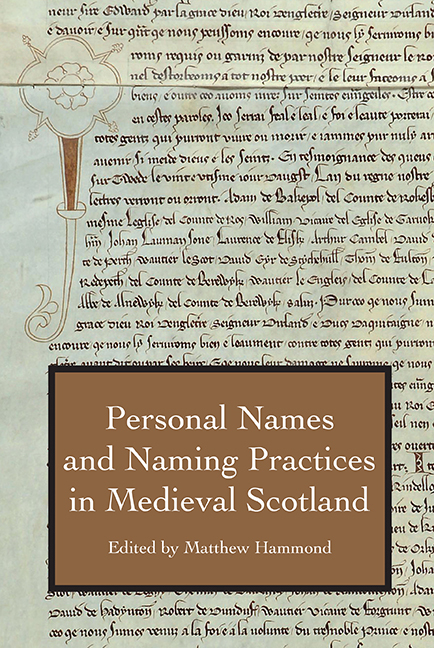Book contents
- Frontmatter
- Dedication
- Contents
- List of Tables
- Acknowledgements
- List of Contributors
- Abbreviations
- Note on the Text
- 1 Introduction: The Study of Personal Names in Medieval Scotland
- 2 Personal Names in Early Medieval Gaelic Chronicles
- 3 Gaelic Personal Names and Name Elements in Scottish Charters, 1093–1286
- 4 The Development of Mac Surnames in the Gaelic World
- 5 Forflissa/Forbflaith/Hvarflöð
- 6 Masculine Given Names of Germanic Origin in the Ragman Roll (1296)
- 7 The Romance of Names: Literary Personal Names in Twelfth- and Thirteenth-Century Scotland
- 8 Old Testament Personal Names in Scotland Before The Wars of Independence
- 9 Duthac Wigmore and Ninian Wallace: Scottish Saints and Personal Names in the later Middle Ages
- 10 Saints in Names in Late Medieval Argyll: a Preliminary Enquiry
- Bibliography
- Index
- Studies in Celtic History
5 - Forflissa/Forbflaith/Hvarflöð
Published online by Cambridge University Press: 18 September 2019
- Frontmatter
- Dedication
- Contents
- List of Tables
- Acknowledgements
- List of Contributors
- Abbreviations
- Note on the Text
- 1 Introduction: The Study of Personal Names in Medieval Scotland
- 2 Personal Names in Early Medieval Gaelic Chronicles
- 3 Gaelic Personal Names and Name Elements in Scottish Charters, 1093–1286
- 4 The Development of Mac Surnames in the Gaelic World
- 5 Forflissa/Forbflaith/Hvarflöð
- 6 Masculine Given Names of Germanic Origin in the Ragman Roll (1296)
- 7 The Romance of Names: Literary Personal Names in Twelfth- and Thirteenth-Century Scotland
- 8 Old Testament Personal Names in Scotland Before The Wars of Independence
- 9 Duthac Wigmore and Ninian Wallace: Scottish Saints and Personal Names in the later Middle Ages
- 10 Saints in Names in Late Medieval Argyll: a Preliminary Enquiry
- Bibliography
- Index
- Studies in Celtic History
Summary
After the death of Henry, earl of Atholl, early in the thirteenth century, succession to the earldom passed first to his elder daughter Isabel and her husband Thomas of Galloway. Following the murder of their son Patrick of Atholl in 1242, the succession then passed to Isabel's younger sister, who was married to David de Hastings. The name of this younger daughter of Earl Henry appears under a number of guises, one of the more extravagant being Forflissa, and one of the strangest Forwht. There has been uncertainty as to the proper name which underlies these forms. This short Note suggests that the countess bore the Gaelic name Forbflaith, and identifies some other bearers of the name in Scotland. It also points to a link with the late medieval Irish Romance of Cearbhall and Fearbhlaith.
The Scots Peerage gives the forms Forflissa and Fernelith for this countess, the Complete Peerage giving the latter. The first of these comes from Sir James Balfour's abbreviate of the lost cartulary of the abbey of Coupar which records a confirmation made by David de Strathbogie, earl of Atholl, for the souls of David de Hastings, formerly earl, Forflissa his countess, and Elen, his own late spouse, of a grant of the lands of Dunfallandy made to Coupar by Ness, physician to King Alexander II. Another abbreviate notes Ness's original grant, given for the soul of Earl David and Forflisa his countess. Elsewhere Sir James gives the form Forulissa. The form Fernelith comes from Lord Hailes's Sutherland Case which notes a grant given by Fernelith, countess of Atholl, for her soul and that of her late husband, David de Hastings.
This last appears to correspond to a grant, included by D. E. Easson in his edition of Coupar Angus charters, made by Forleth, countess of Atholl, for her soul and that of her late husband, David de Hastings, confirming the grant made by Master Ness, the king's physician, of Dunfallandy to Coupar. The backing of this grant apparently read, ‘Confirmatio Fornfleth Com[it]isse Atholie de terris de Dunfolantyne’.
- Type
- Chapter
- Information
- Publisher: Boydell & BrewerPrint publication year: 2019



